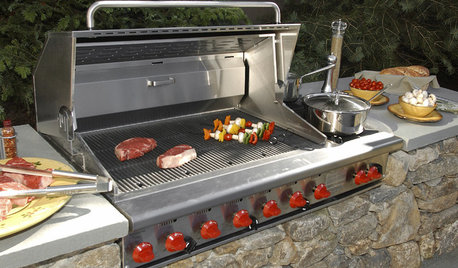Grill Propane Tanks, how much left
jerry_nj
16 years ago
Related Stories

MOST POPULAR8 Ways to Improve Your Grill Setup
Rethinking the old grilling station? Here’s how to pack more function and style into your backyard cooking zone
Full Story
GREAT HOME PROJECTSHow to Get a Built-In Outdoor Grill
Put fresh-air grilling on the menu with a built-in setup that suits your patio or yard
Full Story
OUTDOOR KITCHENSYour Guide to Grills and More for Great Outdoor Cooking
Learn the pros and cons of gas versus charcoal grills, and about neat add-ons that let you do more
Full Story
OUTDOOR KITCHENSYour Grill Season Checklist
Get your barbecue in top shape and round up essential grilling tools to make your backyard cookouts sizzle
Full Story
TINY HOUSESHouzz Tour: A Custom-Made Tiny House for Skiing and Hiking
Ethan Waldman quit his job, left his large house and spent $42,000 to build a 200-square-foot home that costs him $100 a month to live in
Full Story
OUTDOOR KITCHENSOutdoor Room of the Day: This Patio Cooks, Even in the Rain
Washington homeowners create their dream outdoor kitchen with a pizza oven, gas grill, fireplace and more
Full Story
KITCHEN APPLIANCESFind the Right Oven Arrangement for Your Kitchen
Have all the options for ovens, with or without cooktops and drawers, left you steamed? This guide will help you simmer down
Full Story
GREAT HOME PROJECTSHow to Switch to a Tankless Water Heater
New project for a new year: Swap your conventional heater for an energy-saving model — and don’t be fooled by misinformation
Full Story
KITCHEN APPLIANCESFind the Right Cooktop for Your Kitchen
For a kitchen setup with sizzle, deciding between gas and electric is only the first hurdle. This guide can help
Full Story
OUTDOOR KITCHENSHow to Cook Up Plans for a Deluxe Outdoor Kitchen
Here’s what to think about when designing your ultimate alfresco culinary space
Full Story





davidandkasie
jerry_njOriginal Author
Related Professionals
Cottonwood Landscape Architects & Landscape Designers · North New Hyde Park Landscape Architects & Landscape Designers · Simi Valley Landscape Architects & Landscape Designers · Edmond Landscape Contractors · Berkeley Heights Landscape Contractors · Hawaii Landscape Contractors · Lake Zurich Landscape Contractors · Manhattan Landscape Contractors · Metairie Landscape Contractors · Palm Beach Gardens Landscape Contractors · Rockwall Landscape Contractors · East Norriton Landscape Contractors · Lake Morton-Berrydale Decks, Patios & Outdoor Enclosures · Lakeland South Home Builders · Odenton Home Buildersbroke_not
bushleague
jerry_njOriginal Author
broke_not
rcmoser
cranheim
rustyj14
jerry_njOriginal Author
jerry_njOriginal Author
tomplum
jerry_njOriginal Author
tomplum
norman1000